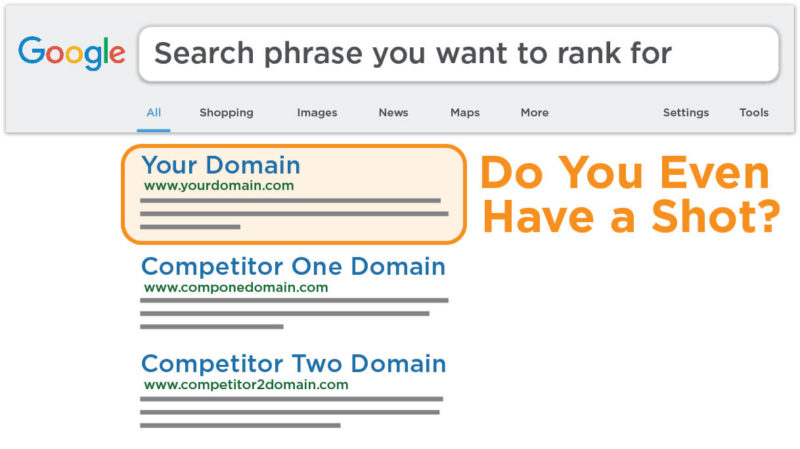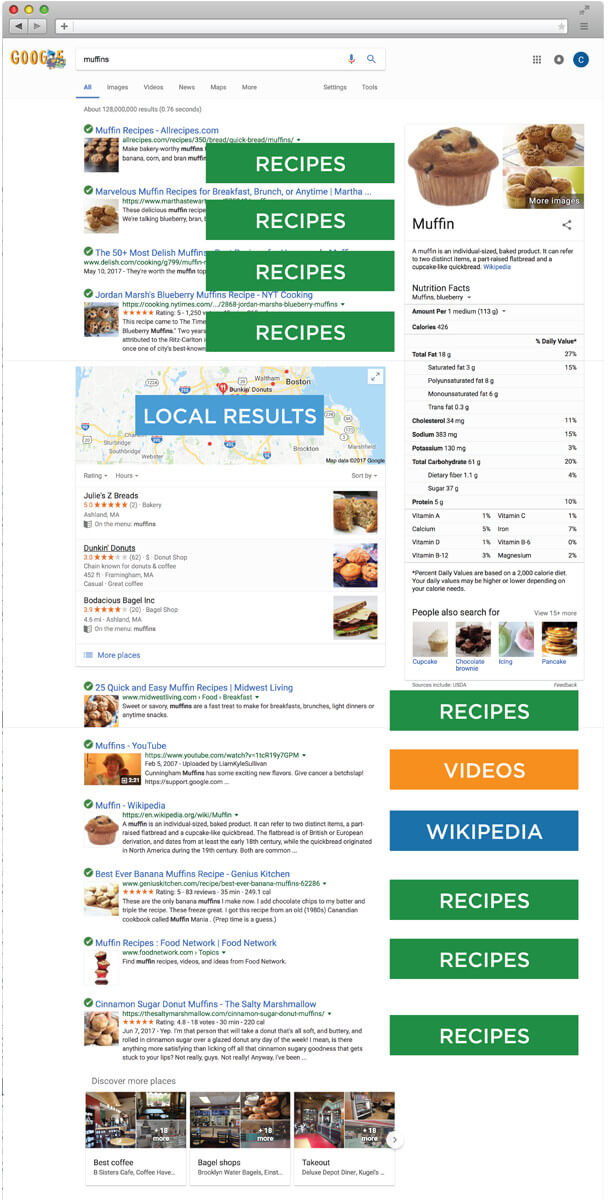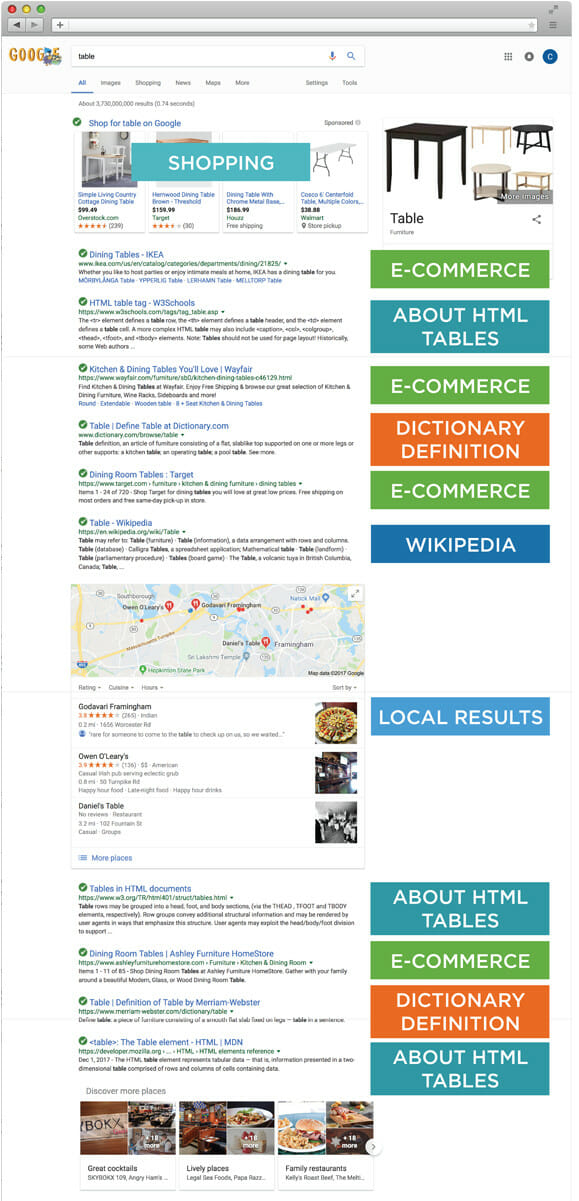Do you have a shot at ranking for that phrase?
Ranking for a particular search query is no longer as simple as creating a targeted page and getting some links. Columnist Eric Enge shows why a deeper understanding of relevance is needed to know which keywords to target.
One of the first items you should consider in putting together an SEO plan is what keywords you should try to rank for. That’s very basic, right?
But the world of SEO has become more complex. It’s not like you can simply decide you want to rank for a keyword, optimize some content on a page, get some links, and — presto! — you rank. That’s because how relevance to a query is evaluated has become far more nuanced.
To better understand how Google interprets user intent, I’d advise that you take a close look at the search engine results pages (SERPs) for your target phrase to see what currently ranks there. Seeing what you’re up against can help you better understand what your chances of ranking are, and it can help you focus on the keywords where you have the best chances of success.
Illustrating with examples
Here is an example of a search query where every single result shown is an e-commerce site (in addition to some local results). If you have an e-commerce site, and you’re trying to rank, congratulations, you have passed the first test! Google loves e-commerce sites for this query, and that means that if you do the right things with your content and promotion strategies, you should have a chance to gain rankings on this phrase.
In contrast, consider the search results for the search phrase “muffins”:
If you are trying to sell muffins online, you’re in trouble with this query. The first four results are recipes, then you have a local results block, another recipe, a video, a Wikipedia page, then three more recipe results after that.
I would not try to get a page selling muffins online to rank for this query (hopefully, we’re talking about overnight delivery!), but you could try to get your own recipe page to rank. The phrase “buy muffins online” might be a better target for your e-commerce page.
Let’s look at one more, where you are selling tables and want to rank for the search query “table”:
This one is a mixed bag. We’ve got a shopping results bar up top, and while that’s not an SEO opportunity, it is one way to play on this SERP. Then you’ve got a shopping site, a page talking about HTML tables, another shopping site and a dictionary definition for the word, a shopping site, and then Wikipedia.
After a local results block, there is another page on HTML tables, followed by a shopping site, another dictionary definition, and one last page on HTML tables. If you’re selling tables online, there are four competing e-commerce sites shown on the first page of results.
That means that Google sees a pretty decent intent match with shopping for tables, and there is an opportunity to get your page up on the first page for this query.
Looking more closely
Let’s say that you want to rank for “table,” and you’re a general purpose retailer that sells all kinds of products, similar to Target. Let’s take a close look at the four competing retail sites from the SERP above:
- Ikea (ranks No. 1) — Specialty retailer that sells furniture
- Wayfair (ranks No. 3) — Specialty retailer that sells furniture
- Target (ranks No. 5) — General purpose retailer
- Ashley Furniture Home Store (ranks No. 8) — Specialty retailer that sells furniture, lighting and kitchen goods
Uh-oh, perhaps “table” isn’t such a great query to focus on after all. Target is the only general purpose retailer ranking for this query. Those other four e-commerce sites all have furniture sales as a core focus for the entire business.
Why would that matter? As specialty retailers, your competitors for this search query are only focused in a limited area, and all of the online signals that indicate that they are good for users will get associated with furniture. From a practical user perspective, they offer a far wider range of options related to tables, and far more related products, since this is all that they do. That is a clear indication of what types of sites Google considers relevant to this query.
Determining user intent
This entire exercise has been about determining what types of pages and sites Google thinks best match up with the user intent of the query. It’s natural for them to offer a mix of results for many types of queries. In the case of the “muffins” query, for a page selling muffins online, Google does not think your e-commerce page is a match at all. You fail the basic relevance test.
Other queries behave very differently, and for those, you need to look more deeply. In our “table” example, we had four retailers, but as a general purpose retailer, it should be concerning that there is only one other general purpose retailer in the top 10 results.
This relates to the other potential intents of the user. People searching for tables may want a wide range of choices for tables, but also other related furniture and in-home goods. At Target, you can also buy clothing, electronics, video games, movies, music and books.
However, those aspects of Target don’t provide great support for the user intent of buying tables. More closely related product offerings and a broader array of table selections to buy from appear to do so, and this is why the specialty retailers perform so well for this query. In addition, Google sees that a lot of users actually want to learn about HTML tables or want a dictionary definition for the word.
Now, Target has managed to get into the top 10, but the point is, it’s the only general purpose retailer to do so. If you’re a general purpose retailer selling tables, and you want to get on the first page of Google for the phrase “table,” your only option may be to displace Target from its place in the fifth position, meaning there is only one spot available to you on that page.
This discussion has been all about understanding the nuances of determining user intent. It’s no longer as simple as honing the keyword relevance of one page and getting some links. Those things still matter, but a deeper understanding of relevance is needed to succeed in today’s search environment, and this should impact what keywords you attempt to rank for.
Using this line of thinking, you can avoid wasting time and effort trying to pursue keywords that you don’t have much chance of ranking for and focus your efforts in places where you have a stronger chance.
Contributing authors are invited to create content for Search Engine Land and are chosen for their expertise and contribution to the search community. Our contributors work under the oversight of the editorial staff and contributions are checked for quality and relevance to our readers. Search Engine Land is owned by Semrush. Contributor was not asked to make any direct or indirect mentions of Semrush. The opinions they express are their own.






